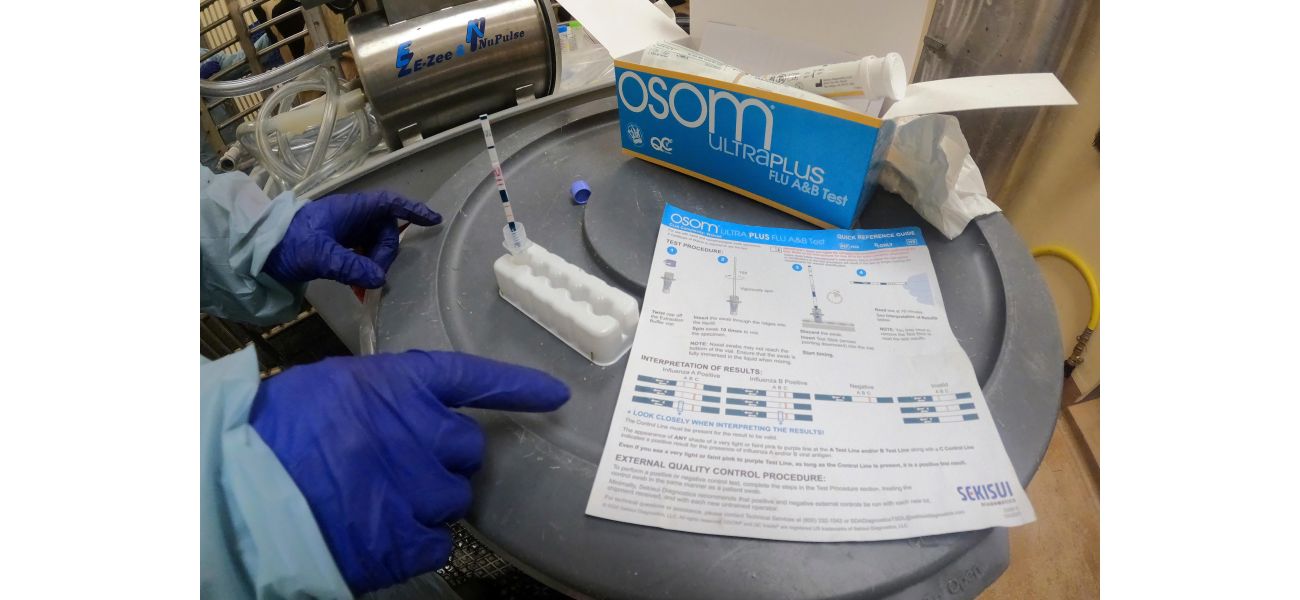USDA mandates milk testing across the country to stop spread of avian flu.
CO mandated licensed dairies to send weekly milk samples for testing starting in July. #dairy #testing #CO
December 6th 2024.

The United States government has taken a proactive step in monitoring the spread of bird flu in dairy cows by ordering the testing of the nation's milk supply. This will provide a better understanding of the virus and its potential impact on the dairy industry. Starting December 16th, raw or unpasteurized milk from dairy farms and processors nationwide will be tested upon request, as announced by the U.S. Department of Agriculture. Initially, testing will be conducted in six states - California, Colorado, Michigan, Mississippi, Oregon, and Pennsylvania.
Interestingly, Colorado has already taken steps to test their dairy cows for bird flu, with licensed dairies being required to submit weekly samples of their milk for testing since July. However, the state has excluded dairies that sell raw milk through a "cow share" program, as they are not regulated by the state. The Colorado Department of Agriculture has stated that the state meets the criteria set by the USDA for demonstrating an "ongoing absence" of bird flu in dairy cattle through their current testing plan. Olga Robak, a spokesperson for the state Department of Agriculture, has confirmed that the USDA will be supporting Colorado's existing program by conducting additional weekly bulk milk tank testing.
The nationwide testing effort is aimed at containing and ultimately eliminating the Type A H5N1 virus, which was first detected in U.S. dairy cows in March. Since then, over 700 herds have been confirmed to be infected in 15 states. In Colorado alone, there have been more than 60 confirmed herds, but currently only one remains quarantined according to the state agriculture department. Agriculture Secretary Tom Vilsack has stated that this testing will give farmers and farmworkers more confidence in the safety of their animals and their ability to protect themselves. It will also put the nation on a path towards quickly controlling and stopping the spread of the virus.
It is important to note that the risk of bird flu to humans remains low, as the virus is killed during the pasteurization process of milk. However, there has still been a push from veterinarians, farmers, scientists, and academics for nationwide milk testing. Keith Poulsen, director of the Wisconsin Veterinary Diagnostic Laboratory, who has been leading the efforts, sees this as a positive step in the right direction. He believes that the government is starting to recognize the need for better monitoring of the virus.
Despite the potential benefits of nationwide testing, some dairy farmers and processors have been hesitant to participate, out of fear of economic or other repercussions. However, Jamie Jonker, chief science officer of the National Milk Producers Federation, has stated that the industry supports the USDA's efforts to eliminate the virus. Under the federal order, dairy farmers and those who handle raw milk intended for pasteurization must provide samples for testing upon request. Positive tests must be reported to the USDA and herd owners must provide basic information to allow for tracing of the disease in cattle.
This order follows a previous one from April 24th, which mandated testing of certain dairy cattle before they could be moved between states and required the reporting of any positive tests. Despite this order, the virus has continued to spread, as noted by Poulsen. It has also been confirmed that at least 58 people in the U.S., including 10 in Colorado, have been infected with bird flu. Most of these cases involve farm workers who became mildly ill after close contact with infected cows or poultry. In Colorado, millions of chickens have been killed this year due to outbreaks of bird flu.
It is not just domestic animals that have been affected by the virus - it has also been spreading among wild birds and a number of other animals. Health officials continue to warn against consuming raw milk, as it can contain a variety of germs that can make people sick. In California, a farm was quarantined and the distribution of milk was halted after bird flu virus was detected in raw milk sold in stores. The farm, Raw Farm of Fresno, has issued a voluntary recall of raw milk and cream produced after November 9th.
In conclusion, the U.S. government's efforts to monitor and control the spread of bird flu in dairy cows through nationwide milk testing is a crucial step towards safeguarding the health of both animals and humans. With support from various organizations and agencies, it is hoped that this will lead to a swift containment and elimination of the virus. As always, it is important to stay informed and up-to-date with health news, which can be easily done by signing up for our weekly newsletter.
Interestingly, Colorado has already taken steps to test their dairy cows for bird flu, with licensed dairies being required to submit weekly samples of their milk for testing since July. However, the state has excluded dairies that sell raw milk through a "cow share" program, as they are not regulated by the state. The Colorado Department of Agriculture has stated that the state meets the criteria set by the USDA for demonstrating an "ongoing absence" of bird flu in dairy cattle through their current testing plan. Olga Robak, a spokesperson for the state Department of Agriculture, has confirmed that the USDA will be supporting Colorado's existing program by conducting additional weekly bulk milk tank testing.
The nationwide testing effort is aimed at containing and ultimately eliminating the Type A H5N1 virus, which was first detected in U.S. dairy cows in March. Since then, over 700 herds have been confirmed to be infected in 15 states. In Colorado alone, there have been more than 60 confirmed herds, but currently only one remains quarantined according to the state agriculture department. Agriculture Secretary Tom Vilsack has stated that this testing will give farmers and farmworkers more confidence in the safety of their animals and their ability to protect themselves. It will also put the nation on a path towards quickly controlling and stopping the spread of the virus.
It is important to note that the risk of bird flu to humans remains low, as the virus is killed during the pasteurization process of milk. However, there has still been a push from veterinarians, farmers, scientists, and academics for nationwide milk testing. Keith Poulsen, director of the Wisconsin Veterinary Diagnostic Laboratory, who has been leading the efforts, sees this as a positive step in the right direction. He believes that the government is starting to recognize the need for better monitoring of the virus.
Despite the potential benefits of nationwide testing, some dairy farmers and processors have been hesitant to participate, out of fear of economic or other repercussions. However, Jamie Jonker, chief science officer of the National Milk Producers Federation, has stated that the industry supports the USDA's efforts to eliminate the virus. Under the federal order, dairy farmers and those who handle raw milk intended for pasteurization must provide samples for testing upon request. Positive tests must be reported to the USDA and herd owners must provide basic information to allow for tracing of the disease in cattle.
This order follows a previous one from April 24th, which mandated testing of certain dairy cattle before they could be moved between states and required the reporting of any positive tests. Despite this order, the virus has continued to spread, as noted by Poulsen. It has also been confirmed that at least 58 people in the U.S., including 10 in Colorado, have been infected with bird flu. Most of these cases involve farm workers who became mildly ill after close contact with infected cows or poultry. In Colorado, millions of chickens have been killed this year due to outbreaks of bird flu.
It is not just domestic animals that have been affected by the virus - it has also been spreading among wild birds and a number of other animals. Health officials continue to warn against consuming raw milk, as it can contain a variety of germs that can make people sick. In California, a farm was quarantined and the distribution of milk was halted after bird flu virus was detected in raw milk sold in stores. The farm, Raw Farm of Fresno, has issued a voluntary recall of raw milk and cream produced after November 9th.
In conclusion, the U.S. government's efforts to monitor and control the spread of bird flu in dairy cows through nationwide milk testing is a crucial step towards safeguarding the health of both animals and humans. With support from various organizations and agencies, it is hoped that this will lead to a swift containment and elimination of the virus. As always, it is important to stay informed and up-to-date with health news, which can be easily done by signing up for our weekly newsletter.
[This article has been trending online recently and has been generated with AI. Your feed is customized.]
[Generative AI is experimental.]
0
0
Submit Comment





